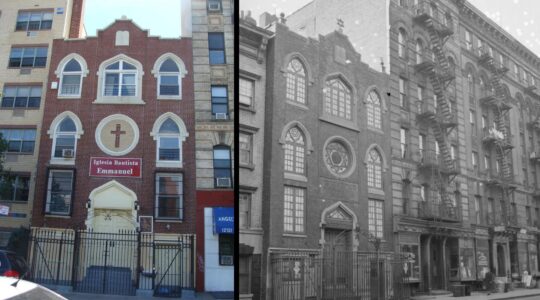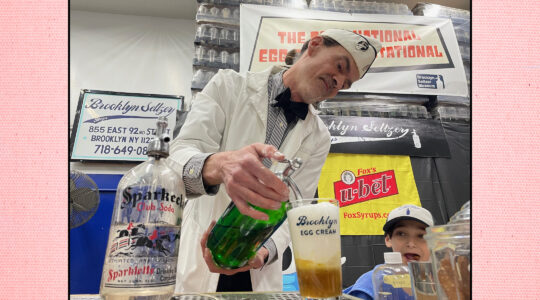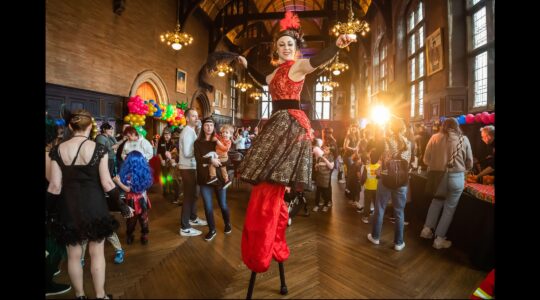Seymour Kaplan was with his battalion in Munich, Germany, on April 29, 1945, when he was ordered into a jeep and driven 10 miles to the Dachau concentration camp. The young solider from Brooklyn was to be among the initial group of American soldiers to enter, passing under the cruelly ironic “Arbeit Macht Frei” (“Work Will Set You Free”) sign.
What he saw there — “a stack of bodies seven feet high … lying there like sacks of potatoes” — was seared into his memory, yet he didn’t recall the vision for a half-century.
Alan Moskin was assigned to Gen. George Patton’s 3rd Army when he helped liberate the Gunskirchen concentration camp, a sub-camp of Mauthausen in Austria.
It was the stench that got to him. “I can still smell it every time I talk about it, it was so powerful.” Unprepared for what he had seen, the words to describe what his senses took in didn’t come for decades.
Kaplan and Moskin, both 88, are now beginning to talk more fully about their wartime experiences, and they will be part of a unique conference this weekend at a Holocaust center on Long Island that will honor Nazi survivors, victims, liberators and rescuers.
But the two have paid a steep price for keeping the horrors they witnessed at war’s end bottled up for 50 years. As the memories eventually came flooding back — triggered in Kaplan’s case by a reunion of military buddies — and with them nightmares and crying fits, both men were diagnosed with post-traumatic stress disorder (PTSD). The condition, common among the liberators, will be discussed at the daylong conference, “Generations,” this weekend at Hofstra University, in a panel titled “Trauma and Liberation: Coming to Terms with the Legacy of Witness.”
“A lot has been written about the PTSD suffered by survivors, but very little has been written about the experience of the liberators and how traumatic it was to liberate those camps,” said Eva Fogelman, a psychologist here who wrote and coproduced the documentary, “Breaking the Silence: The Generation After the Holocaust.”
“The GIs, like many of the Holocaust survivors, did not speak about their experiences and were not asked,” she said. “Very few wives knew what their husbands experienced in World War II. The camp experience was very overwhelming for the liberators. They came into a situation where they saw so many people near death, and they felt helpless. They had no medication and some liberators who had food with them fed these people, which killed some. They had meant well, but they felt responsible for having killed them.”
The experience, Fogelman said, is something “they will never forget.”
According to historian Beth Lilach, senior director of education and community relations at the Holocaust Memorial and Tolerance Center in Glen Cove, L.I., which is sponsoring the conference, “This is the first time I have heard of a conference that is really allowing this topic to be discussed and examined.” (For a list of workshops and to register, visit www.holocaust-nassau.org.)
What they witnessed “really affected liberators,” she said, adding that sometimes their experiences are passed on to their children.
Lilach said she knows of the son of a liberator who is now in his 50s or 60s and who has been so affected by his father’s trauma “that he barely leaves his home. … It has had a profound influence on shaping his life.”
She pointed out that neither military nor civilian mental health professionals were trained to deal with the psychological issues the liberators faced immediately after the war, just as they were ill prepared to work with the survivors of genocide.
“There were no orders to liberate the camps — they just stumbled onto them by accident,” Lilach said, “and they were not psychologically prepared for what they found.”
Trying to put the memories behind them, the liberators returned to normal life, but they were changed men.
“When the GIs came back, many of them went to school, got married, and were busy with their jobs and raising a family,” Fogelman said. “There was not a lot of time for mourning. But now as they age and retire, they have more time on their hands and this provides the psychological space that is necessary to reflect about the past.”
Fogelman added that it was not until after Vietnam that the Veterans Administration began to examine PTSD and “how that experience has psychological consequences.”
♦
Seymour Kaplan said that before he took that jeep ride to Dachau, he had heard the name, “but I thought it was just a town.”
When he arrived, he saw a concentration camp with the words “Work Shall Set You Free” in German on the entrance. American military officers were standing, speaking with Nazi officers still dressed in full uniform, having surrendered only minutes earlier.
Kaplan said that as he entered the camp with other soldiers “en masse,” he looked to his left and “saw a stack of bodies seven feet high.”
“These were prisoners who had been executed and they were lying there like sacks of potatoes, only some of them had slid down so as to form half a pyramid,” he said.
Kaplan, who said he had been summoned to the camp to be a translator because he was fluent in Yiddish, was told to tell the prisoners that they were there to help them and that doctors were on the way.
“I told them in Yiddish, ‘I’m an American soldier, I’m Jewish and you’re free. … I remember saying, ‘I’m a Yiddisha boy.’ I saw other piles of the dead that still had live ones in them. I went over to them. They didn’t respond. It was like talking to the dead — but they moved.”
After the war, Kaplan blocked out that image and other horrors he saw that morning.
“I shut it off for 50 years,” he said, adding that he founded a garment manufacturing business and later worked as a teacher.
But he decided to attend a reunion with his former military buddies in 1995 “with no thought of Dachau,” Kaplan said. “But it was always on my mind.”
While there, he saw his former captain and asked, “Was I at Dachau?”
“He said, ‘Describe what you saw.’ I did, and he said, ‘You were at Dachau.”
The memories came flooding back. After seeing a war movie, Kaplan said he remembers telling his wife, “That’s what a concentration camp looked like.”
“Everything brought back the memories — a German uniform,” Kaplan recalled.
He said he went to a Veterans Administration hospital about five years ago. He saw a psychologist, who found that he was suffering from post-traumatic stress disorder (PTSD), for which the Army now pays him a disability check. He said he has received no treatment.
Alan Moskin, of upstate Nanuet, said he and his buddies liberated Gunskirchen on May 4, 1945, four days before VE Day.
“It was an horrific site — piles of skeleton-like bodies all over the place. The first thing I remember was the overpowering stench. … There were thousands and thousands in the camp. Those who were alive were so emaciated it defies description. … And they were crawling in the mud; some were praying. I yelled out in German that I was Jewish.”
Moskin said he was directed to tell them that he and his fellow soldiers were Americans, that they would be taken care of, and that they were now free.
He said he then entered one of the barracks.
“There were bodies all over the muddy ground, some on top of each other. Some were alive and some were dead. Everywhere you turned you smelled the foul stench of the dead and the dying. There were thousands. … One buddy of mine, who was not Jewish, said it was like the devil himself took a vacation and came here.”
As soon as the war ended, Moskin said, it all hit him emotionally.
“I had severe nightmares after the war. … I was crying, I had sweats and fits of cursing. They called it shell shock and battle fatigue, and they didn’t know how to treat it. So I locked up part of my brain and said I was not going to talk about those experiences because I was afraid to bring back those memories. When asked, I just said I was a soldier and did my job and that was it. I didn’t tell my wife or kids.”
After the war, he earned a law degree from New York University and worked for 20 years as a trial attorney and then in the private sector until retiring in 1991. His war memories stayed locked up until, in 1995, he was asked by the Holocaust center in Spring Valley to speak about his experiences as a liberator.
“It was like a catharsis; it all poured out of me,” Moskin said. “It’s good for me to get all that stuff out, and I want to get across to the students I speak to that there was a Holocaust, that it was not a myth.”
Both Moskin and Kaplan said they have spent the last several years speaking about their experiences.
“It’s clearer to me now than it was then,” said Kaplan. “It’s like it was yesterday.”
The New York Jewish Week brings you the stories behind the headlines, keeping you connected to Jewish life in New York. Help sustain the reporting you trust by donating today.




